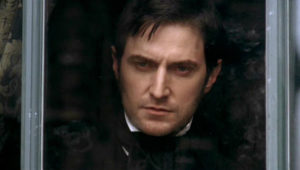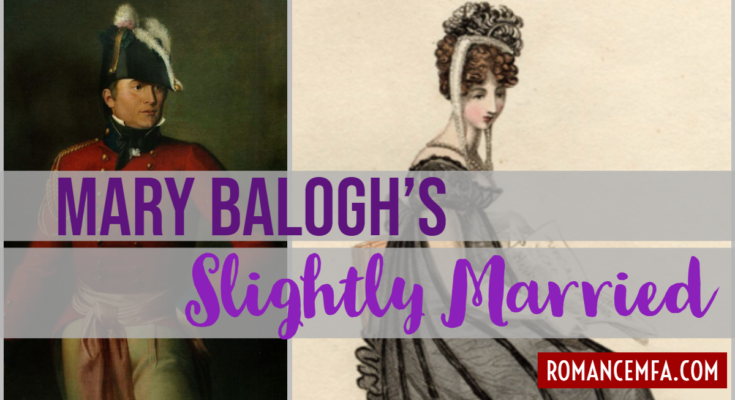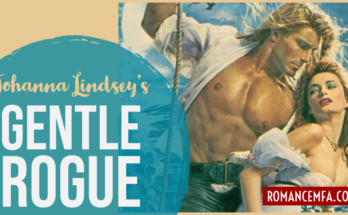My next Regency read is Mary Balogh’s Slightly Married, which came to my attention from NPR’s 2015 list of top 100 romances. In terms of research and plot, it was reminiscent of Heyer—but definitely not Heyer.
Book details:
Title: Slightly Married
Author: Mary Balogh
Original publication date: 2000
Setting time & place: 1814 England
He is… a 30 year old ducal heir with an over-developed sense of honor and duty.
She is… a 25 year old Welsh coal-miner’s daughter, independently wealthy through her mother’s family, and bereft of all immediate family.
Reasons to read this title: Balogh is a favorite author for many, and particularly known for her marriages of convenience, of which this is an excellent example.
My review of Slightly Married
Is it a romance novel? Yes. Two characters work through emotional turmoil and achieve an HEA.
Is it a must read romance novel? If you’re into marriage of convenience and historical accuracy.
Slightly Married opens with our heroine, Eve, who seemed virtuous to a fault to me at the outset. She has a whole household of petty criminals and orphans and outcasts whom she shelters because she is So Good. And she stand to lose it all because of Legal Inheritance Reasons—unless she marries. Which is the set up for the marriage of convenience, a plot which Balogh is admittedly fond of. She writes on her blog,
it is a way of getting the hero and heroine married early in the story so that the rest of the book can contain all the intimacies of their growing relationship without the restrictions that would otherwise be imposed upon them. I don’t have to contrive ways to bring them together in almost every scene. They live together! My books are almost all set in early 19th century Regency Britain when young ladies in particular did not have the freedom of movement and the privacy we take for granted today. Finding realistic reasons for them to be alone with their heroes, especially in ways that give time and opportunity for intimacy (even if only a kiss!), can be challenging. If the couple is married, then they can be alone together as often as they like (or as often as I want them to be).
(How exciting to be far enough into this project that I’m reading books by authors who have blogs!)
Anyway, once the marriage has been contracted, falling in love allows Eve a character arc which made her more likable and less Goody Two Shoes. The reader, along with the hero, learns that she is, in fact, not a virgin. His reaction to this revelation was my favorite moment in the whole book (although I couldn’t really follow the logic when they spontaneously decided to consummate the marriage and we suddenly went from Heyeresque to relatively explicit 🤔).
He went very still and searched her eyes with his own while she listened to the echo of her words. She had never once dreamed that she would have to confess that to him. “Ah,” he said then, very softly. “Fair enough. Neither am I.”

I’ll also say at this point that I don’t usually think about actors, but something about Balogh’s descriptions caused me to immediately cast Richard Armitage as our hero, Colonel Lord Aidan Bedwyn. I couldn’t not think of his broody face as I was reading.
As the story continues, it becomes clear that Eve’s previous sexual experience was with a dude who was keeping her as a side piece. She thought they were engaged, but he’s incommunicado. By the time he shows up, she’s married to Aidan and has started to reassess her priorities and think about what she wants for herself. While she started the book with her own wants hidden internally (the previous relationship was always secret) and her caring for her dependents the only externally obvious parts of her character, by the end of the book, she is able to admit (to herself and to him) that she wants her husband for herself. It’s a big step from her reasons for marrying him at the beginning, when she frames him as a legal necessity for her stability, a social prop, a protector against less honorable men in the neighborhood, and a suitable father figure for her adopted children.
So, props to Balogh for having a heroine who is never shamed for her sexuality or sexual experience by anyone, and for the character arc of realizing she can treat herself, as well as being a nurturer for others. However, I did sigh a bit when I realized that Eve is a possession to male characters for the entire book. She was her father’s daughter, and although she managed to turn down all the marriage matches he tried to make, she’s still tied to the stipulations of his will. After her father’s death, she was her brother’s charge, a responsibility he imparted to the hero before dying on the battlefield. With her two closest male relations dead, Eve has to marry or she will lose her home and be totally unmoored in the world. I suppose it’s well within the historical bounds for women in the Regency Era but still—Yikes!
Once Eve and Aidan are married, a large part of the plot hinges on the fact that she is a possession not only of her new husband, but of the male head of his family. Her new brother-in-law, the Duke of Bewcastle, almost immediately swoops in to order her about. Balogh finds places for Eve to push back and assert her own independence—but it still leaves sighing sadly for my foremothers and feeling glad for my legal rights, such as they are in 2019.
That said, this book made me realize that the Exceptionally Honorable and also Kind hero is not my catnip. Every time the Duke of Bewcastle showed up to be insufferably rude and angsty, however… If I come back to Balogh, it will be skipping the four books in the middle of this series to read the last one, so I can see the Duke get what’s coming to him.




You can’t skip the rest. The ones in the middle make Wulf’s tale more juicy. His book is my favorite.